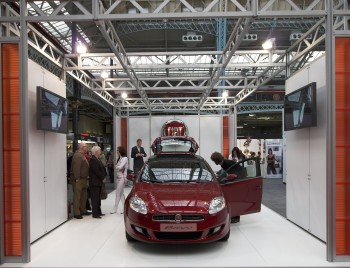|
Fiat Group
Automobiles SpA is to be the Official Partner of the Italian
Football Federation (FIGC) for the next four years. The
agreement reached with the FIGC regards the men’s national
squad (A team and under-21s) and involves the supply of Fiat
Group Automobiles SpA vehicles to staff for their use on the
occasion of official games, friendlies and training camps.
A symbol of the
very highest sporting and human values, the Italian national
football team has always enjoyed the allegiance of millions
of fans and communicates a positive image of Italy all round
the world. The agreement reached between Fiat Group
Automobiles and the FIGC thus confirms the company’s
strategy of linking the Fiat name to sports teams of the
absolutely highest level and with outstanding international
reputations. The agreement will begin on 28 March at Bari on
the occasion of Italy-Scotland, a Euro 2008 qualifier.
With four FIFA
World Cups to their name, Italy are rightly held up as one
of the great football nations. Their first triumph was way
back in 1934 at the second ever global showcase, held on
Italian soil. Four years later in France, they became the
first team to successfully defend their crown while their
third title was secured in 1982 in Spain. where Italy lifted
the World Cup thanks largely to an outstanding performance
by striker Paolo Rossi. After a subdued start to the
tournament, Rossi burst into life in the knockout stages,
scoring a hat-trick against Brazil to put his side through
to the semi-final, where he struck twice more against
Poland. Brimming with confidence, the Italians then went on
to beat West Germany 3-1 in the final, with Rossi scoring a
sixth tournament goal to clinch the Golden Shoe as top
scorer. Germany last year marked Italy's 16th appearance at
a FIFA World Cup finals, making Sweden 1958 the only finals
they did not grace with their presence. It also represented
their fourth World Cup triumph, after a hard working and
impressive display from a team that weren't regarded as
favourites at the start of the tournament.
Italy's strong
national league, boasting world-famous sides such as AC
Milan, Juventus and Inter Milan, has traditionally provided
the platform for a competitive Italy team. Over the years,
Serie A has produced true legends of the game such as
Roberto Baggio, Paolo Maldini, Franco Baresi, Gianni Rivera
and the unforgettable Dino Zoff who played in the victorious
1982 side at the age of 40.
|
 |
|
Fiat Group Automobiles SpA vehicles will supply the
Italian Football Federation with vehicles (including
the new Bravo (above, at the Viva Italian Exhibition
in London earlier this month) for their staff to use
on the occasion of official games, friendlies and
training camps. |
|
|
 |
|
Fiat Group Automobiles SpA is to
be the Official Partner of the Italian Football
Federation (FIGC) for the next four years. Photo:
The Italian National Football Team celebrate winning
the FIFA World Cup in Germany last summer. |
|
|
However, life has not always been a bed of roses for the
Italians, who have suffered their fair share of
disappointments, including an abrupt exit from the 2002 FIFA
World Cup Korea/Japan. After battling their way through to
the Round of 16, the Azzurri succumbed to hosts Korea
Republic. Italy led for most of the match but conceded a
late equaliser and the South Koreans secured victory with an
extra-time golden goal.
In the wake of
this crushing blow, Giovanni Trapattoni replaced Dino Zoff
and led Italy through qualifying for UEFA EURO 2004. One
defeat and just four goals conceded in eight matches marked
a return to the traditional Italian virtue of resolute
defending but more disappointment awaited the Azzuri
in the finals in Portugal where they failed to progress
beyond the group stage despite not losing a match. Having
drawn against Denmark (0-0) and Sweden (1-1) in their
opening two games, a 2-1 victory over Bulgaria saw them
finish only third in the group behind the two Scandinavian
sides.
Trapattoni then
made way for former Juventus coach Marcello Lippi who
immediately adopted the mantra "No-one is guaranteed a
place" – something Alessandro Del Piero and Christian Vieri
soon found to their cost. A new generation emerged, all
eager to seize their opportunity. Between summer 2004 and
autumn 2005, Lippi gave debuts to nine players - Cristian
Zaccardo, Andrea Barzagli, Giorgio Chiellini, Daniele De
Rossi, Manuele Blasi, Mauro Esposito, Luca Toni, Alberto
Gilardino and Vincenzo Iaquinta – and together they
accounted for eight of the 15 goals scored by Italy on the
qualifying road to the World Cup in Germany, where they went
on to win.
|
|
|
|